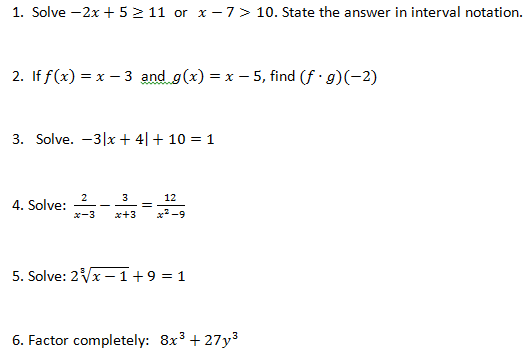What Advisors Need to Know about Developmental Education Courses
Department Policies/Recommendations:
- We have an attendance policy that affects the student’s grade after a set number of absences, depending on the meeting schedule. For example students who have 6 absences in a 4 day-a-week semester class lose 2% off of final grade for each additional absence. Similarly, students who have 3 absences in a 4 day a week half-semester class lose 2% off a final grade for each additional absence.
- Math faculty have agreed that they will not allow students to enter after the 3rd class meeting day. At that point students are too far behind and data shows they do not pass. Students are advised to sign up for the next half-semester session. Send students directly to the instructors; the director will not sign students into a class without express faculty agreement.
- We recommend that you schedule students for success in their half semester math courses; assume they will pass and move to the next course in the sequence.
- At the half semester, math instructors notify students of their final grade since students cannot see them in MyAkron. We do drop students for lack of prerequisites as late as possible to allow time for schedule changes. We work closely with the advising units on campus to notify them which students need intervention.
92 - 90 A-
89 - 87 B+
86 - 83 B
82 - 80 B-
79 - 77 C+
76 - 73 C
72 - 0 F
Grading Scale (%)
The student must have a “C” or better to pass any of our developmental courses.
The grading scale is listed here:
This is because a C is required for passing, so a student earning a D would have to retake the course. However, financial aid does not pay for a repeated course if the student obtained a D in the initial attempt. Therefore, we eliminated the “D” grade so that the cost of the second attempt is covered by financial aid.
Courses:
There are 3 types of courses: math, writing and reading. All are non-credit courses. They do not count towards a degree, but they do count for financial aid and readmission. They are not counted in the GPA and a “developmental GPA” is not calculated.
Writing Course
2010:042 - Basic Writing (4 load hrs) - Uses narrative writing to teach basic writing skills. Includes sentence structure and punctuation. Does not use the 5 paragraph essay.
Special sections: An accelerated half-semester section is usually offered in the fall semester. This is co-requisite with and should be followed by the half semester English 121. Meets 4 days a week for a double class period (100 minutes)
Reading Courses (4)
2010:062 - College Reading and Study Skills (4 load hours) - Covers basic reading concepts (finding main ideas, patterns of organization, critical thinking) study strategies (outlining, notetaking, graphic organizers, learning preferences) and vocabulary strategies (word parts and context clues). Students read 3 college level articles on each topic: addiction, happiness and motivation. Final unit has student incorporate a synthesis of all articles as they relate to The Other Wes Moore. Each unit test and the final exam include an essay where the student chooses and supports a position.
2010:064-Applied Study Strategies: Intro to Psychology
2010:064-Applied Study Strategies: Intro to Sociology
2010:064-Applied Study Strategies: Human Relations
2010:064-Applied Study Strategies: Survey of Basic Economics
(2 load hours each)
For students near the cut score (see placement table); satisfies the developmental reading requirement in only 2 load hours instead of 4 load hours
These are CO-REQUISITE COURSES. Students MUST be enrolled in the content course in order to be eligible to take the course. Students use the text from the content area course-no other text needed. Students learn and apply condensed version of skills in 062 to the content course. Uses reading selections, practice test questions and vocabulary from the content area course to teach strategies. This is not tutoring or a study hall. The final is a portfolio demonstrating skill development and reflecting on academic growth.
Math Courses (5)
2010:081-Fundamental Math I (2 load hours) - Topics Covered
2010:082-Fundamental Math II (2 load hours) - Topics Covered
2010:083-Fundamental Math III (2 load hours) - Topics Covered
2010:084-Fundamental Math IV (2 load hours) - Topics Covered
2010:085-Fundamental Math V (3 load hours)
Calculators are not allowed in any of these courses.
Where students start in the course sequence:
Students may start with any course in this sequence based on placement scores. Students may also start the sequence at mid-semester although we think it is better to start at the beginning of the semester so maintain the opportunity to repeat a course in the same semester if needed.
Scheduling sequential courses in the semester:
Students starting with either Fund Math I, II, or III at the beginning of the semester should also register for the next sequential course in the second half of the semester.
Transition between courses at mid-semester:
At mid-semester we end the first half semester courses a couple days before the second half semester classes start so that students know their course grade early enough to make changes to their schedule in the second half if needed. Students should know their 1st half course grade on Monday of week 8. The 2nd half of the semester typically starts on Wednesday of week 8.
When the courses are offered:
All four of the half semester courses are typically offered each half of the fall and spring semesters as well as the summer semester. Fund Math V is offered both fall and spring semesters and may also be offered in the summer.
Similarities to Basic Math I and II:
Fund Math I and II cover the same material as the four hour semester course Basic Math I.
Fund Math III and IV cover the same material as the four hour semester course Basic Math II.
Two versions of Fundamental Math IV: FM IV is offered as both a full semester course (two 50 minute classes a week) and a half semester course (four 50 minute classes a week). In the full-semester version (referred to as the stretch course) the material is covered at the same pace in class but there are more days between classes for the student to work on the material.
Fundamental Math V (Replacing Intermediate Algebra): This course is much more challenging than the first four courses in the sequence due to the amount of material covered and the pace at which it is covered. It is only intended for students who will eventually need to take calculus and who are unable to place directly into Algebra for Calculus. The material covered and pace of coverage will be the same as it was with Intermediate Algebra. However, classes will be much smaller than the Intermediate Algebra classes have been on the main campus and they will be taught by experienced faculty when in the past they were frequently taught by graduate students.
Four day a week classes versus two day a week classes:
We offer a small number of two day a week 4 load hour classes (Fund Math I, II, III, and IV) as well as two day a week 3 load hour classes (Fund Math V – early evening only). The material is covered at the same pace in class for two day a week classes but the student has more work to do between classes. This tends to be a problem for students who are less disciplined.
Sample Problems:
We created the following lists of sample problems from each course to help advisors when discussing which course to take or if the student disputes the placement test scores. These are sample problems of what a student is expected to be able to do, without the use of a calculator, after completion of each course.
FUNDAMENTALS OF MATH I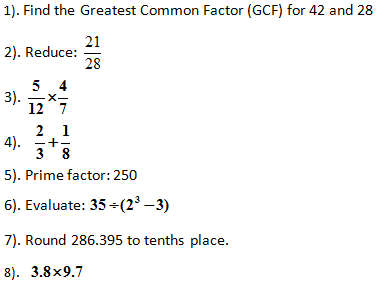
FUNDAMENTALS OF MATH II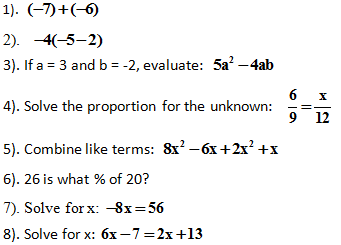
FUNDAMENTALS OF MATH III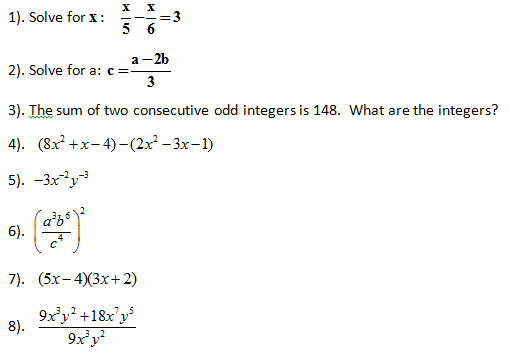
FUNDAMENTALS OF MATH IV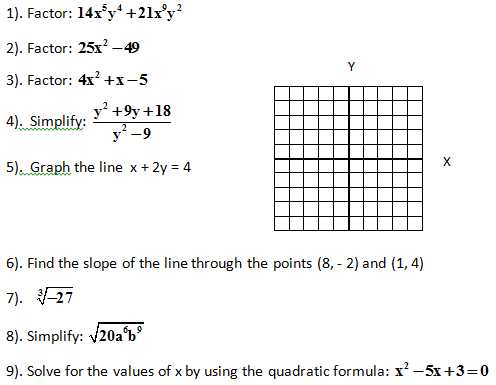
Fundamentals of Math V